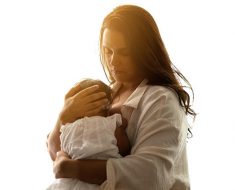If you purchase an independently reviewed product or service through a link on our website, SheKnows may receive an affiliate commission.
When I found out I was pregnant with our rainbow baby, I put off announcing it — because aside from the uncertainty of my high-risk pregnancy, I was conscious of triggering followers who were dealing with fertility challenges.
After I gave birth, I shared our news on social media. I was grateful and relieved to have had so much support, as well as a few unfollows – which I anticipated. However, I also noticed a month had passed until I finally heard from a close Instagram friend.
It wasn’t like her to not be in touch irrespective of my news, so I knew something was up.
Having experienced the ups and downs of trying to conceive (TTC), I know all too well the sudden unease which unravels when you stumble across the words “sensitive post” and an image of a scan surrounded by hundreds of syringes.
For me personally, it had always provoked conflicting emotions of feeling happy for them, but sad for me. My friend’s response epitomized the same sentiments, and her social media hiatus began to make sense.
“Sorry I haven’t been in touch to celebrate your news …” she stated. ”I want to be genuinely excited for you, and I will be once I’m in a better head space.”
I was gutted, as if we’d broken up with each other. As much as I knew it wasn’t personal, I convinced myself that my secrecy was to blame.
However, that was my own insecurity surfacing. These differences that arise are fairly common in online friendships in the TTC community, according to Julianne Boutaleb, a perinatal psychologist and Founder of ‘Parenthood in mind’.
She explains that the rapport between TTC peers usually starts on a level playing field, when both parties have a fertility diagnosis, and “buddy up” to help manage their experiences.
However, as I’ve borne witness to myself, Boutaleb reflects that “the sense of closeness and supporting each other can change as each journey starts to diverge.”
In my case, I had a positive pregnancy test around the same time my friend’s IVF cycle unfortunately failed. So I felt guilty that I had success (albeit naturally), while she was sadly dealing with the devastation of her fifth failed embryo transfer.
Feeling powerless, I couldn’t find the right words to encourage her. I was fearful of coming across as smug or insensitive at a time I may have been perceived as “better off”.
I gradually retreated into a cesspool of negative thinking, toying with unhinged scenarios — that if my pregnancy ended or never happened, the situation would be less awkward.
Deep down I knew those thoughts were irrational, because It was a pregnancy I had earnestly prayed for after all I had been through. When I sought medical advice, I was informed that the intrusive thinking was a symptom of Post Traumatic Stress Disorder (PTSD), a condition that develops in people who have experienced a distressing event, and in effect can sometimes trigger “survivor’s guilt”.
A 2021 study which examined cognitive models of the disorder define this guilt as a particular kind that develops in people who have survived a life-threatening situation.
Examples have originally been ascribed to Holocaust survivors, which makes my personal encounters seem like hyperbole.
But having endured a near-fatal ectopic pregnancy (when the fetus is located outside the uterus) in September 2019, and then conceiving against all odds — with one fallopian tube — two years later, I couldn’t shake the overwhelming sense of remorse I had for my fellow advocates who were still waiting for their miracle.
Boutaleb, who supports parents with a variety of issues throughout pregnancy, reproductive loss and beyond, clarifies that survivor’s guilt can present itself in a unique form within online communities like Instagram — where somebody follows your account because your content mirrors what they’re going through.
However, once there’s a pregnancy announcement it can cause impassioned feelings of disappointment for the person on the receiving end of the news.
It’s this reaction which can intensify so much as to make the other party feel like they are mourning the loss of friendship, as well as handling the issue of helplessness and disconnection towards the community.
Boutaleb, who also provides online resources through her “parenthood in mind” instagram account, states that survivor’s guilt may be linked to grief. She asserts, “It is a manifestation of health events such as infertility diagnosis, recurrent pregnancy loss, and fertility treatment”. All of which are understood to be a form of “reproductive trauma”. The term was first coined by perinatal psychiatrist Dr. Janet Jaffe, and Dr. Martha Diamond, in 2005 to describe the psychological impact of the said experiences.
Jaffe and Diamond, who are founders of the ‘Center for Reproductive Psychology, explain on their website that, “reproductive trauma … attacks both the physical and emotional sense of self,” in that they present you with multiple, complicated losses that impact important relationships and make you feel as if you don’t belong.
It was my own sense of belonging which seemed at threat, because transitioning into a new realm of motherhood meant I grappled with if, and how, I could redefine my position — and whether people could still relate to me.
After receiving that message, I made a decision to minimize my presence online. I’ve always respected the TTC community as a safe space, and owing to my own complexes, I was conscious that my interaction with other advocates who are still on their journey would perceive my interaction as disingenuous.
On the other hand, I faced the dilemma of departing from a group that gave me so much buttress and friendship. And having to leave other Black women who needed extra help made me nervous about the impact it would have, particularly because we already receive less support.
Regina Townsend, founder of advocacy group The Broken Brown Egg and author of the infertility memoir Make IF Make Sense
, says that Black people’s interpersonal relationships and emotional experiences with each have always been in the scope of “a collective”.
She raises a point that, “If we [Black women] are successful, it is not just for us but our family, and neighborhood, etc. Contrarily, if we fail we share those losses too.”
Those feelings of collective responsibility are carried into our fertility journeys, and this explains why I was consumed with so much conviction.
Boutaleb sees this regularly in her clinical experience, remarking, “When you’ve both been through trauma, you may unfortunately trigger each other. This psychological notion is called ‘containment’, when the mother [figure] aids growth and alleviates anxieties by acting as a ‘holding environment’.”
In a similar way, people with infertility diagnoses needing treatment to conceive often feel misunderstood by the wider parenting community. When they find someone who understands them, they feel “contained” by each other. However, in the event of either person becoming pregnant or progressing in their journey, it may cause strong, primitive feelings of anxiety, anger, or even abandonment — because often these relationships stand in for others.
For Black women, this withdrawal can be disadvantageous to our trauma recovery, as we already have to navigate in silence and isolation due to the stigma attached to fertility challenges in our community.
I became so conscious that I had caused upset to others. So as some advocates have done, I contemplated setting up another account in order to protect my TTC followers from content which could possibly be provoking.
Then I received a message from another follower that changed my perspective. She wrote, “I’m so pleased to see your news. Thank you for your sensitivity in your post. It was beautiful and thoughtful. I’m encouraged by your story. Thanks for all that you do.”
It was so validating, and I was instantly reminded about why I chose to hold space and share my fertility story: I wanted to provide hope to families who are still on their journey, and enact on being the resource that I once needed.
Boutaleb explains, “This example of helping others is the upside of survivor’s guilt, called survivor’s mission”.
Judith Herman, who writes about this in her book Trauma and Recovery, expresses this to be an element of post-traumatic growth when someone makes positive use of their experience by giving back to support the community.
As the saying goes, “Guilt can be a good thing. It’s a soul’s call to action”.
I turned my pain into purpose, and I’m committed to continuing to share my journey — shamelessly and sensitively — so the hope survives.
Source: Read Full Article





